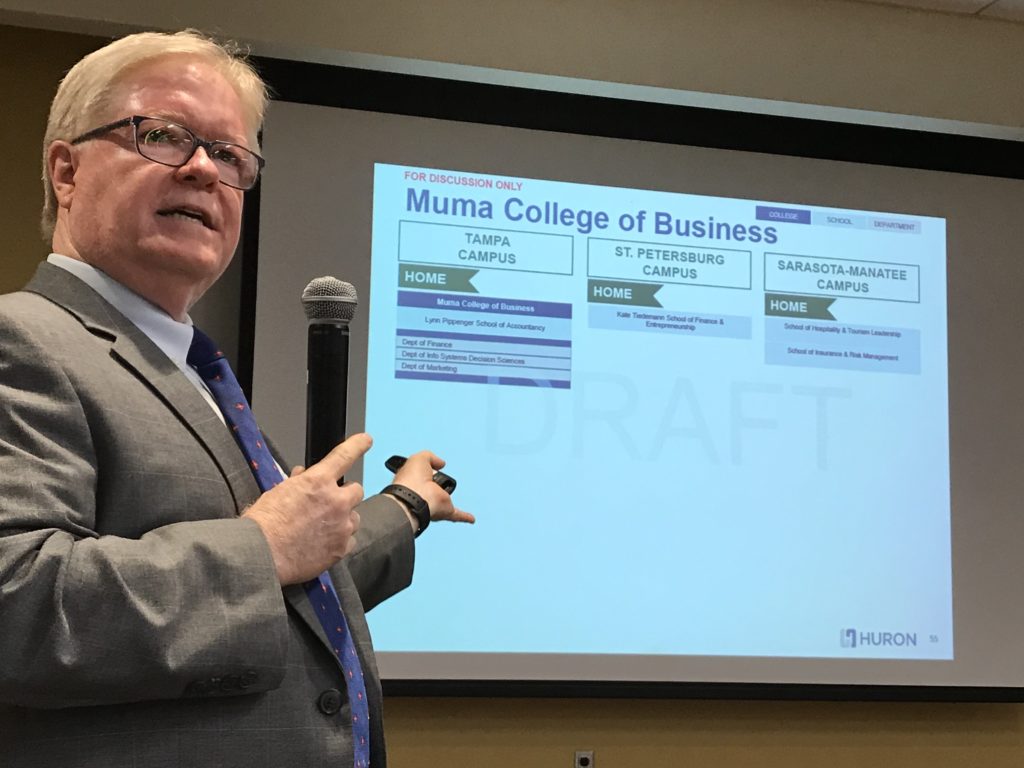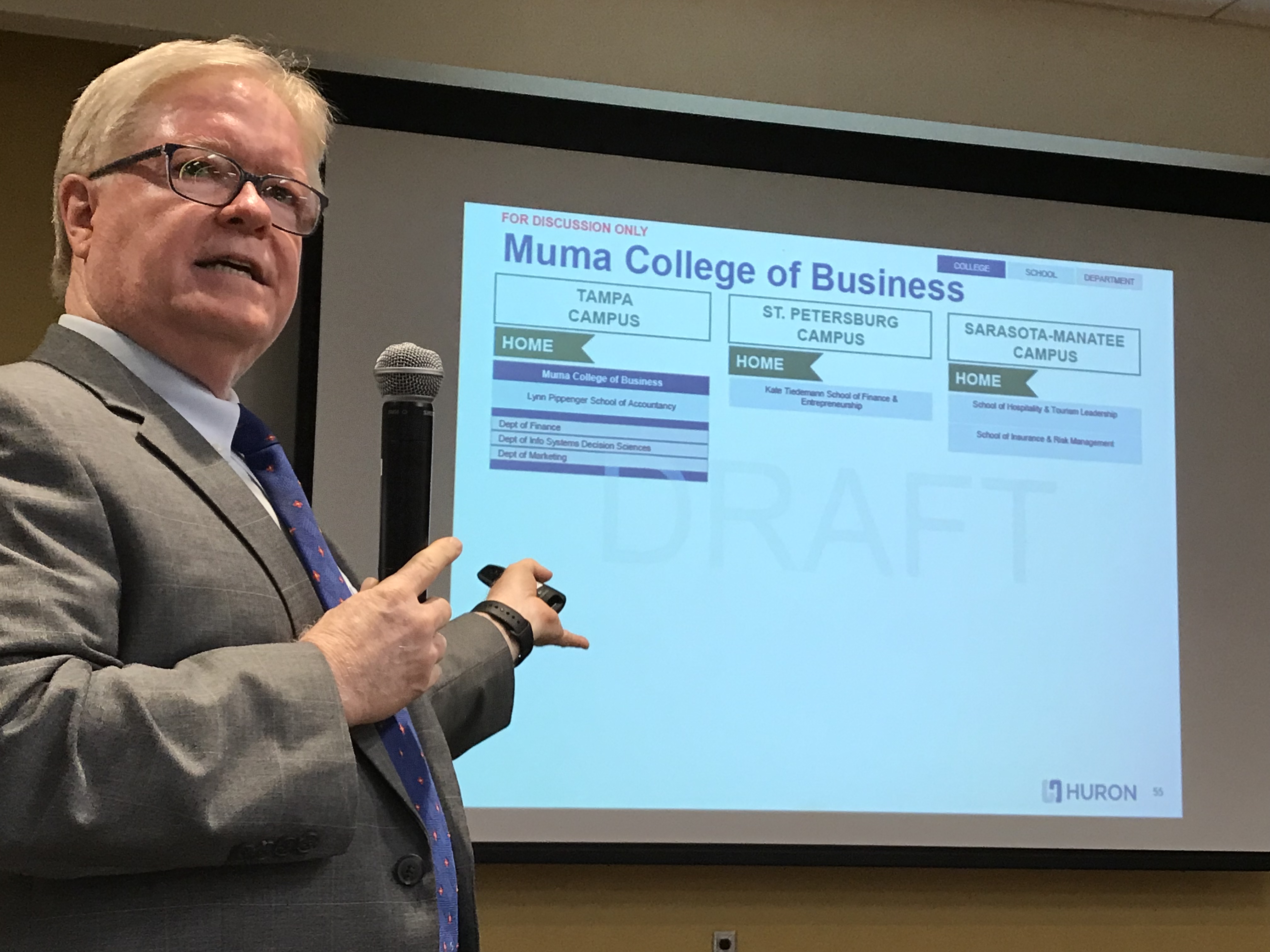
Regional Chancellor Martin Tadlock explained a consultant’s consolidation recommendations at a campus forum on Sept. 25. He wants the St. Petersburg campus to get more. But is anybody listening?
By Nancy McCann
In mid-October, Martin Tadlock emailed the St. Petersburg campus community to outline his vision of what the campus might look like after consolidation in 2020.
Come to a meeting of a consolidation task force subcommittee on Oct. 18, he wrote, and learn more about his ideas.
At the last minute, however, Tadlock’s plan for colleges and schools that should be located at USF St. Petersburg was dropped from the agenda.
He later said he expected to give his presentation at a future meeting – but that didn’t happen either.
Since July, the subcommittee on campus identity and academic programs has heard from BayCare Health System, FCCI Insurance Group and several high-level administrators from the three USF system campuses.
It has heard from organizations like the Southern Association of Colleges and Schools, the Tampa Bay Partnership, and the Board of Governors for the state university system.
And it has heard from Huron Consulting Group, the Chicago-based firm that is helping plan consolidation with a multitude of observations, flow charts and initial recommendations that enhance the power of the Tampa campus at the expense of St. Petersburg and Sarasota-Manatee.
But the subcommittee never did hear what Tadlock, the regional chancellor in St. Petersburg, recommends for his campus in response to the reorganization Huron proposed last September.
Tadlock said last week he is not concerned that the subcommittee made its recommendations to the full consolidation task force in November without hearing his recommendations.
“The task force did not expect to have a hand in every piece of the consolidation process,” he said.
“Organizational structure rests with the administration. There are conversations that will be coming about where schools and colleges will be (based) and they will include Karen Holbrook (USF Sarasota-Manatee’s regional chancellor) and me.”
“I’m sure I will get to share my thoughts.”
The consolidation task force must submit its recommendations to the USF Board of Trustees by Feb. 15, and the trustees must present a plan to the state Board of Governors by March 15.
The trustees have scheduled a workshop to discuss a consolidation timeline plan at 2 p.m. Jan. 14 in Ballroom A of the Marshall Student Center on the Tampa campus.
For St. Petersburg, a lot is at stake.
The campus lost its independent accreditation when — without warning and little discussion — the Legislature last spring decided to consolidate the three campuses of the USF system by July 1, 2020.
Since gaining its accreditation in 2006, the St. Petersburg campus has seen a spurt in size, prestige and momentum.
Some of its champions, on campus and in the community, fear much of that will be lost under consolidation. Their fears increasingly seem well founded.
USF St. Petersburg now has a College of Arts and Sciences, a College of Education and the Kate Tiedemann College of Business. The prestigious College of Marine Science is based in St. Petersburg but reports to Tampa.
Under Huron’s preliminary model, however, St. Petersburg would lose its three colleges and be left with a college it essentially already has – the College of Marine Science. That would be renamed the College of Oceanography, Environmental Sciences and Sustainability.
The Huron plan would also give St. Petersburg a School of Art and Art History and turn the College of Business into the Kate Tiedemann School of Finance and Entrepreneurship.
The College of Education is given short shrift in the Huron plan. It is not replaced by any schools, but there would be a Department of Science and Math Education and a number of smaller education programs.
In contrast, Tadlock’s consolidation recommendations would give St. Petersburg two colleges: A College of Humanities, Arts and Sciences and a College of Oceanography and Environmental Sustainability.
His outline also has two schools: a Kate Tiedemann School of Business and a School of STEM Education and Innovation.
The subcommittee recommended to the task force that at least one college be based at each campus to reflect its “unique identity.”
But the Tampa Bay Times maintains that is not enough.
“The idea (behind consolidation) is to create one seamless, preeminent university,” the Times said in an editorial earlier this month. “But the final proposal should be an improvement over (Huron’s) initial plan, which failed to give USFSP enough improvements to offset the loss of its now-independent colleges of business, education and arts and sciences.”
Tadlock contends that students are most concerned with the major they can complete on campus, not where the schools and colleges are located.
“For example, we have nursing coming to St. Pete in the fall,” he said. “There’s a plan for a cohort of 20 to 25 students. They can take all courses here and complete clinicals in St. Petersburg hospitals.”
He said a recent $1 million bequest to USF St. Petersburg’s arts program will “likely expand the visual arts first, and then the performing arts,” and the campus would gain under any academic structure under consideration.
“Probably the biggest benefit from the work of the task force has been the increased understanding about the university from those members who didn’t know much about us,” said Tadlock.
“People in the community have learned a tremendous amount about Sarasota and St. Pete,” he said. “Now we have people who are our advocates and understand how they can help students.”
Highlights of consolidation recommendations
The three subcommittees of the USF consolidation task force have completed their work and sent recommendations to the task force, which meets at 1:30 p.m. on Jan. 29 in TECO Hall in the College of Education building on the Tampa campus.
Here are some highlights:
- Increase master’s and doctoral degree programs on the St. Petersburg and Sarasota-Manatee campuses no later than July 1, 2021.
- Ensure that at least one college is based on each USF campus and “reflects the unique identity” of that campus.
- Add a student representative as a full member to the USF System Academic Program Advisory Council and rotate the student member by campus each year.
- Develop new academic programs on each campus that are part of the master academic plan and lead to more vibrant connections with business communities and other communities of interest.
- Support the growth of campus research initiatives and strengths through strategies including joint appointments for faculty on the St. Petersburg and Sarasota-Manatee campuses.
- Strengthen relationships with local businesses and nonprofit organizations in relevant industry sectors, including the arts, aviation, health care, insurance, engineering and real estate, to leverage community strengths.
The full list of final recommendations by the subcommittees can be found here (see page 5)



